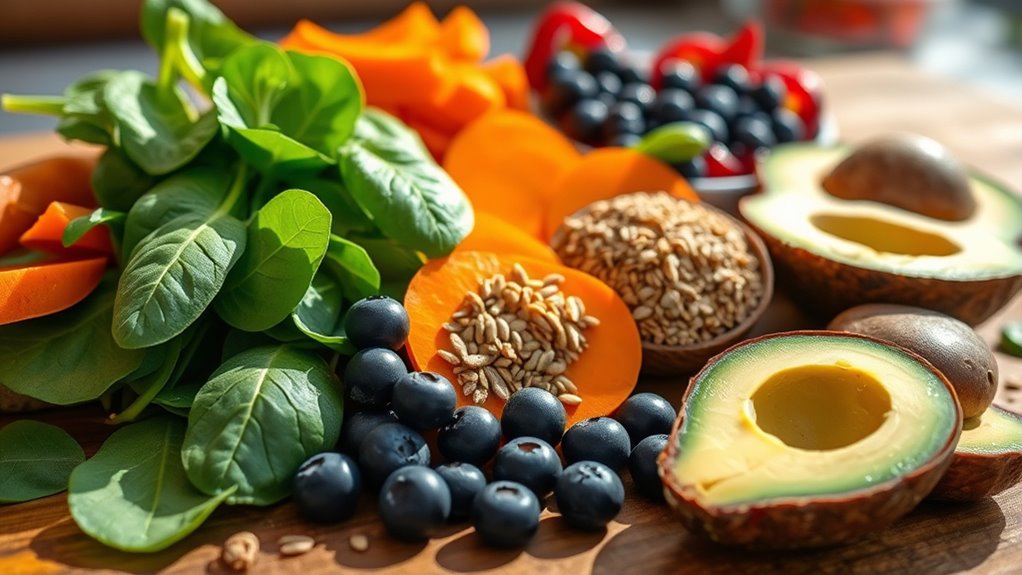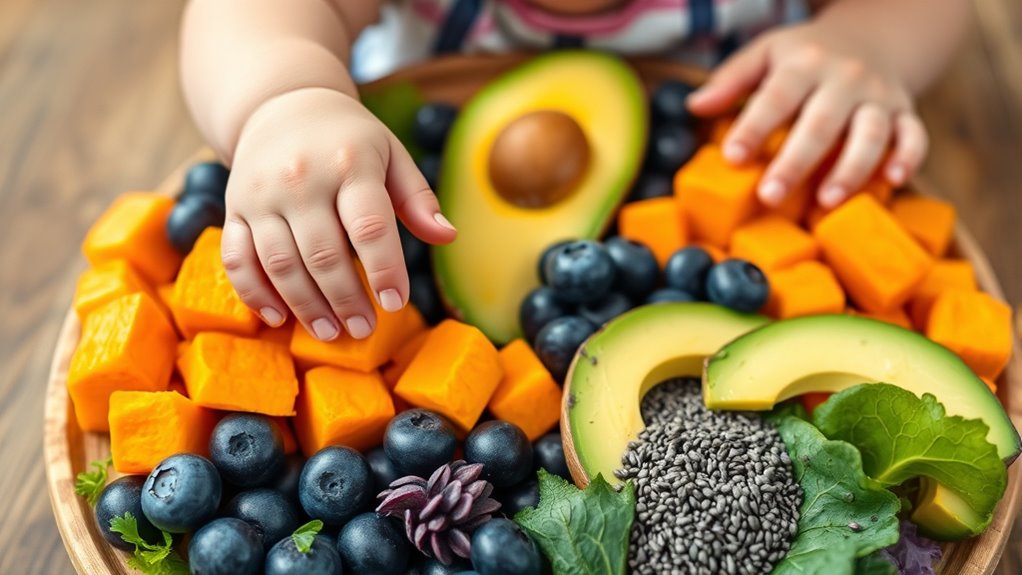Discover surprising superfoods your baby should be eating to support their growth and immune health. Incorporate nutrient-dense options like sweet potatoes for eye health, avocados for brain development, berries for antioxidants, and lentils for plant-based protein and iron. Proper preparation, such as thorough cooking and proper hygiene, guarantees safety and better nutrient absorption. Offering a variety of textures and flavors helps prevent monotony. Keep exploring these healthy choices to give your little one a strong start to life.
Key Takeaways
- Incorporate nutrient-rich superfoods like sweet potatoes, avocados, berries, and lentils to support your baby’s growth and immune health.
- Always handle and prepare superfoods with proper hygiene, thorough cooking, and age-appropriate textures to ensure safety.
- Introduce new superfoods gradually, starting with small portions and monitoring for allergies or sensitivities.
- Use gentle cooking methods like steaming or baking to preserve nutrients and create smooth purees for easy digestion.
- Vary superfoods regularly to provide a broad spectrum of vitamins, minerals, and antioxidants essential for healthy development.

Introducing superfoods for babies can be a great way to boost their nutrition and support healthy growth. These nutrient-dense foods are packed with essential vitamins, minerals, and antioxidants that help lay a strong foundation for your little one’s development. When incorporating superfoods into your baby’s diet, understanding their nutritional benefits is key. For example, sweet potatoes are rich in beta-carotene, which supports eye health, while avocados provide healthy fats crucial for brain development. Berries, like blueberries and strawberries, offer antioxidants that strengthen the immune system, and lentils supply plant-based protein and iron necessary for growth and energy. Including a variety of these foods ensures your baby receives a broad spectrum of nutrients to thrive.
Additionally, practicing proper food handling and hygiene during preparation can help prevent foodborne illnesses in infants. Preparation tips are just as important as selecting the right superfoods. When introducing new foods, start with small portions and observe for any adverse reactions, since babies can be sensitive to certain ingredients. For soft fruits like bananas or ripe avocados, simply mash or blend until smooth to avoid choking hazards. Root vegetables like sweet potatoes or carrots should be cooked thoroughly—boiling, steaming, or roasting until soft—and then pureed to a smooth consistency. Legumes such as lentils or chickpeas need to be cooked well and mashed or pureed to ensure easy digestion. Always aim for simple preparations without added salt or sugar, as babies’ kidneys are still developing and can be sensitive to excess salt or sweeteners. When serving, ensure the texture is appropriate for your baby’s age—thinner purees for younger infants and gradually thicker textures as they grow.
Another preparation tip involves introducing one new superfood at a time. This approach helps you identify any potential allergies or sensitivities. Keep portions small initially and increase gradually as your baby becomes accustomed to new flavors and textures. Make sure to incorporate a variety of superfoods over time to prevent dietary monotony and to provide a wide array of nutrients. Steaming or baking foods preserves their nutritional content better than frying or excessive boiling, which can leach out vitamins. Always check that foods are cool enough before feeding, and offer them in manageable sizes to prevent choking. By focusing on proper preparation and presentation, you’ll help your baby develop healthy eating habits early on, making nutritious superfoods both appealing and safe for your little one to enjoy.
Frequently Asked Questions
Are Superfoods Safe for Newborns?
You might wonder if superfoods are safe for your newborn. Generally, it’s best to wait until your baby is a bit older before introducing superfoods, as their digestive systems are still developing. When you do start, focus on superfood preparation that guarantees nutrient absorption is maximized and minimizes choking risks. Always consult your pediatrician before introducing new foods, especially superfoods, to ensure they’re safe and appropriate for your baby’s age.
How Can I Introduce Superfoods Gradually?
Did you notice how smooth shifts make everything easier? When incorporating superfoods into your baby’s diet, start with small portions and observe their reactions. Use simple superfood preparation methods like purees or mash-ups, gradually increasing variety. You might find surprising success by mixing new superfoods with familiar foods. This gentle approach helps your baby adapt comfortably to new flavors and textures while ensuring they get the benefits of these nutritious foods.
Are There Any Superfoods to Avoid for Babies?
You should avoid superfoods with high superfood potency that might cause allergies or digestion issues in your baby. Also, steer clear of superfood variety that’s not appropriate for little ones, like honey or certain nuts, until they’re older. Always check with your pediatrician before introducing new superfoods, especially those with strong flavors or potential allergens, to make sure your baby’s safety and health.
What Are Signs of Allergies to Superfoods?
When you introduce superfoods to your baby, watch for signs of allergies, which can include allergic reactions like hives, swelling, vomiting, or difficulty breathing. Early symptom identification is pivotal to keeping your baby safe. If you notice any of these signs, stop feeding the food immediately and consult your pediatrician. Being attentive helps you respond quickly and ensures your baby’s health and well-being.
Can Superfoods Replace Traditional Baby Foods?
Ever wonder if superfoods can replace traditional baby foods? While superfood myths suggest they’re nutrient-dense, they shouldn’t fully substitute familiar options. You need a balanced diet that offers all essential nutrients for your baby’s growth. Superfoods can complement traditional foods, adding variety and extra nutrients, but they aren’t a complete substitute. Focus on a diverse diet to ensure your little one gets everything they need for healthy development.
Conclusion
Incorporating these superfoods into your baby’s diet can boost their growth and set the foundation for healthy eating habits. With so many nutritious options available, why not make every meal an opportunity to nourish their little bodies? Remember, the key is balance and variety—your baby’s taste buds will thank you, and so will their future health. Isn’t it worth investing in their well-being now for a healthier, happier tomorrow?










